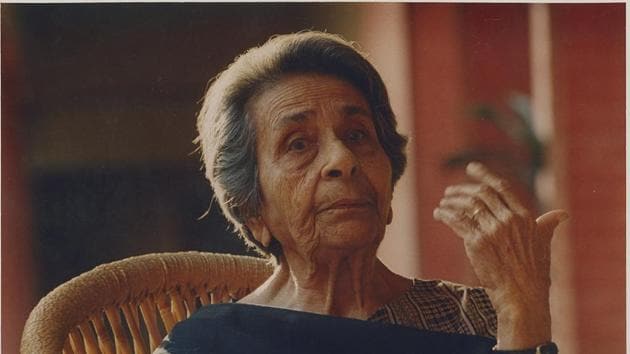‘I couldn’t keep her request but that didn’t soured our relations’
Amrita Pritam was a famous Punjabi writer and poet, who became the first woman to win the National Sahitya Akademi Award in 1956.
Amrita Pritam was a famous Punjabi writer and poet, who became the first woman to win the National Sahitya Akademi Award in 1956. A recipient of the Padma Shri, Padma Vibhushan and Janpith, she is remembered for poems such as ‘Ajj Aakhaan Waris Shah Nu (Today I invoke Waris Shah)’ — which is an elegy to the 18th century Punjabi Sufi poet — and ‘Pinjar (The Skeleton)’, among many others. Her works have been translated in several Indian and foreign languages. Gulzar pays a tribute to her on her 99th birthday.

The first time I heard Amrita Pritam’s famous poem, ‘Ajj Aakhaan Waris Shah Nu’, recited by none other than the well-known actor-writer Balraj Sahni, was at a meeting of the Punjabi Sahit Sabha in Mumbai. As a young poet in the late 1950s and 1960s, I was acquainted for the first time with the Punjabi poetry of Amrita Pritam in Mumbai. I was a member of the Progressive Writers Association and also went to attend meetings of the Punjabi Sahit Sabha that had luminous writers such as Rajinder Singh Bedi, Balraj Sahni, Harnam Singh Naaz and Sukhbir.
It was an immensely popular poem then as it is now and left a listener with goose pimples; more so for those who had migrated from Punjab to the new nation of Pakistan. Those were unhappy and unsettled times for the migrants, many of whom were unemployed and searching for work.
My meeting with the legendary lady of letters came much later when Basu Bhattacharya was making a documentary on Amrita and her soulmate Imroz. I had known Inderjeet Imroz before he came to Mumbai and stayed with another artist, Pardooman, and together did some paintings and calligraphy for the Sohrab Modi film, ‘Mirza Ghalib’ (1954). But it was the first time I came face-to-face with Amrita. Basu Da introduced me and she asked me, “What do you do?” I told her that I assisted in direction and also wrote some poetry.
She asked me to recite a poem and I recited ‘Dastak’, which spoke of friends arriving from across the border coming to our home and mats being laid out in the courtyard and food being cooked, but alas it turns out to be just a dream. She made me recite it again at lunchtime and after the pack-up she asked me to stay back with Basu Da. There were just Amrita, Basu Da, Imroz and I in the drawing room. The decor included paintings by Imroz in which he had painted the beauty of his lady love. There were amazing lampshades which had calligraphy by Imroz of lines from Amrita’s poetry.
There grew a literary acquaintance with the acclaimed poet and she took interest in my writing and lyrics. She also published several of my poems in a magazine she brought out with Imroz. It was called ‘Nagmani’.
After some more years of struggle, I became a director and set up my one-room office in Cosy Homes at Pali Hill in Mumbai. One day Amrita and Imroz came to meet me there. I welcomed them and I gave her my chair as a respect to a senior poet, while Imroz and I sat across the table on chairs kept for visitors. She had a request that I make a film on her novel ‘Pinjar’. She had a script with her and I told her to leave it with me overnight and we would discuss it the next day.
I went through the script and got a copy of the novel in Urdu and read it at night; they would be meeting me again the next day. In the second meeting, I told her that I would like to make a film on just the first three chapters, which were about Puro’s story, but for that I would have to write a screenplay. Amrita insisted that the film was to be made just as she had scripted it. When I declined saying that this was not possible and suggested that she make the film herself the way she wanted it, I could see displeasure on her face when she left.
However, this episode did not in any way sour our acquaintance. Whenever I went to Delhi, I would go to meet her. She published a long interview with me in ‘Nagmani’ and that became the prologue of my first book in Hindustani, ‘Chand Pukhraj Ka’.
The last visit to see her was with Gopi Chand Narang, then president of the Sahitya Akademi, to give her the Akademi’s prestigious Lifetime Achievement Award. Sadly, she was then just a piece of flesh. She recognised no one nor could she speak. Imroz said, “These awards should come when a person is well enough to appreciate them.” Narang replied that he wanted it to reach her in her lifetime.
A year later, I recited her poems for a music company in tribute and each word touched my heart and I also recited from the heart”.






